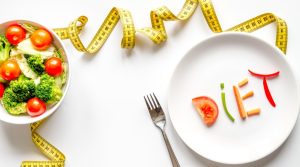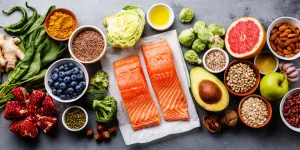Athletic training is associated with several additional factors in addition to hard work. Everything depends mainly on what one has on the plate. Recovery and performance are enhanced, as well as mental clarity as well. It does not matter whether an individual is an already established swimmer or just a beginner; knowing how to incorporate the right food into everyday life will help anyone reach the absolute athletic level.
Think of what it would be like to have sustained energy through workouts, improved recovery from workouts, particularly intense ones, and improved mental focus when it matters most. That is how nutrition works! It is never about eating only less or more calories, rather it is engaging in the appropriate combination of macronutrients and micronutrients that is required for an active person.
Are you ready for a balanced diet? Then you are in the right place as optimal nutrition is what stands between you and success in the upcoming athletic challenge.
Understanding Macronutrients
Macronutrients are the building blocks of a balanced diet. They are carbohydrates, proteins, and fats. Each of them is of vital importance for athletic performance. Carbohydrates and fat serve as the main fuel source. Try to visualize this as serving your body throughout the exercise with energy carbohydrates. Energy from complex carbohydrates like whole grains, fruits, and vegetables allows the athlete to endure a rigorous training program with ease.
Proteins recover and even build up the muscles. Athletes recover from large-scale exertion only when they take Retin a. They can effectively be achieved through added lean meats, fish, legumes, and dairy in your meals. Fats are not to be disregarded also. In addition, healthy fats are vital for hormone synthesis and body health. Foods that contain avocados, nuts, and olive oil can assist with nutrient assimilation and provide long-term energy too.
Micronutrients for Optimal Performance
Micronutrients can be referred to as those essential components which are mostly hidden in an athlete’s meal. These vitamins and minerals are vital in energy metabolism, muscle operation as well as recovery. Getting the right nutrients can help enhance metabolism and control and improve immune support thanks to vitamins B6 and C. Iron is one of the minerals that help in the transport of oxygen to reduce fatigue during energetic exercise sessions.
Calcium is important to keep bones strong, mainly when you are applying pressure on yourself with hard training. Magnesium assists muscles in contracting and relaxing therefore spams are less likely to occur. And do not forget the antioxidants you get from fruits and vegetables. As they prevent oxidative damage which is often caused by strenuous activities.
Fueling Tips and Tricks for Athletes
An athlete must not neglect the threshold in humidity as well. This augments the performance of an athlete as well as helps in recovery. First of all, drink some water before, during, and after your workouts. A lot of water areas are also contributed by electrolyte ingestion. During a heavy workout session, take sports drinks that replace lost minerals like sodium and potassium. This will enable one to stay in a fluid balance.
If an athlete wants to stay well hydrated in a healthy way, he keeps a tab on the color of the urine. Clear to light yellow indicates proper hydration levels, while dark yellow is a call for attention and asks the body to replenish. Your water intake should seek to remind you in one way or the other in a given day. Sometimes, we forget when we are busy or concentrating more on training than other things.
Athletic Food Planning
Food planning is of great importance if athletes want to attain the ultimate peak performance. It is not only about sufficient meal consumption but, rather, about proper nutrition. Start with the attempt to review your training calendar. It is easy to think that training at higher intensities days should be high in carb amounts for energy. Recovery days could be less with carbs temple however attention could be on proteins and healthy fats.
Try making all lunches at the beginning of the week and freezing them to be more effective during the week. Meals can be made ahead of time and used for the periods before or after workouts to save time. Include a reasonable meal plan that contains a wide variety of foods to provide all the nutrients needed. Preferably, look at colorful fruits and vegetables, whole-grain foods, lean proteins, and healthy oils.
Dietary Additives that Promote Athletic Performance
Every athlete does have a supplement regime. It should supplement the diet of an athlete rather than replace the wholesome diet. The fluctuating nature and demands of training may necessitate the use of supplements and the inclusion of protein shakes after workouts. Protein powders are among the most popular supplements that help athletes recover from exercise and induce muscle growth. Calories gained post-workout are crucial, and these are eaten through protein powders. Creatine stands out as the most investigated sports supplement that enhances one’s strength and power while performing high-intensity exercises. It assists in the resuming of muscle energy called ATP.
Planning a Healthy and Realistic Diet
Planning a healthy and realistic diet should form part of the graphemic athletic skill components. Analyze the current diet and habits. Determine what you want more of and what factors you would like to eliminate. Eliminate processed food as much as you can. Remember to add enough fruits and vegetables lean proteins and other essential food items such as whole grains to your meals. These choices not only support your body but also supply essential vitamins and minerals.
There is also a limitation in portion size as well. Learn the necessary serving sizes that satisfy your energy requirement without unduly excess. Please try to vary your routine by nutritious adequate meals. Meal preparation can be implemented for most of the strenuous weeks, enabling a healthy diet without making the individual work so much.
Conclusion
Sports performers must give special regard to consuming a well-balanced and appropriate diet as it is necessary for optimum performance. If the right macronutrients are understood and reframed as an appropriate goal, food can be served to meet energy requirements and recovery respectively. Therefore, the appropriate micronutrients will also enable the body to endure and perform awesomely during crises.
Hydration cannot be neglected as it determines both existing vivre and endurance. With the appropriate schedule on diets, you are set for achievement in training and contesting activities. Extra items may give good value, but the intake should be in addition to the complete meals rather than without them.
Inflicting such an approach is only available if you want to keep on living in such a way for the rest of your life. Now look at it as nutrition which will also be part of your development, your performance and well-being will be enhanced.




